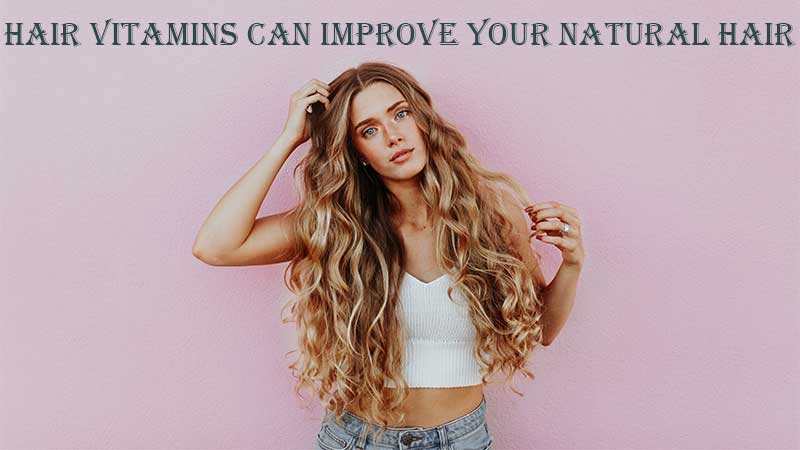
Vitamins or organic hair health supplements are popular among the masses for better hair growth and texture. The reasons behind hair damage can be many. It can occur due to genetic factors, hormones, medications such as cancer drugs or chemotherapy, and various clinical conditions (such as stress, hypothyroidism, or autoimmune disorders), making lives challenging for many. In case of hair fall problems or degradation of hair quality or texture due to deficiency of certain nutrients such as vitamins or minerals, hair health supplements can help with its restoration. The nutrients in hair growth supplements also help maintain the body’s overall health.
How do Hair Vitamins Improve Natural Hair?
The different ways these hair vitamins help in hair care and enhance hair health are as follows:
1. Increases Sebum
Vitamin A is one of the most important hair vitamins as it helps build sebum, which is needed to keep the scalp and skin conditioned and healthy. A decrease in sebum due to vitamin A deficiency causes drying, irritation, itching, and flaking of the scalp. It also makes the hair dry, brittle, and brittle easily. However, it should be remembered that consuming more than normal vitamin A can also lead to hair loss.
2. Improve Metabolism
Vitamin B1 or Thiamine is a common ingredient in hair vitamins. Thiamine is necessary for efficient metabolism, making it a common ingredient in hair vitamin supplements. With age, the body’s metabolism slows down, and that slows down hair growth. Nerve damage that also comes with age creates internal stress that disrupts healthy hair cell functions. Thiamine prevents nerve damage so that hair cells (and follicles) can grow to the desired length.
3. Enhance Blood Circulation
Vitamin B3 or Niacin is a B complex vitamin and is commonly found in food supplements. Niacin enhances blood circulation and also provides oxygen and nutrients to the hair follicle, which is the principal reason it is essential for healthy hair growth. One cannot have healthy hair without a healthy scalp or an overall healthy hair regimen. However, it is advisable to take it in conjunction with other multivitamins to ensure a healthy balance in your body.
4. Hair Growth
Vitamin B7 or Biotin is also from the B complex family known as vitamin H. It is one of the most important hair vitamins as biotin facilitates hair growth. Biotin is a water-soluble vitamin. This vitamin is essential to maintaining our body’s function and metabolism. Biotin is present in most of the diets followed. This biotin in food generally helps to supply the recommended amount. Foods that can help us meet and meet our biotin quota include oats, egg yolk, spinach, etc. Biotin is available as a popular hair growth supplement in many forms, including pills, solutions, and delicious gummies.
5. Helps in Collagen Formation
Vitamin C plays a key role in collagen formation since it is an antioxidant. Therefore, a Vitamin C deficiency would result in problems of dry scalp, brittle hair, and split ends.
6. Aid in the Production of Hair Follicles
Vitamin D facilitates the production of hair follicles, which enhances better growth. Vitamin D also helps to maintain stress levels and ensures better conditions for healthy hair.
7. Nourishment and Protection
Vitamin E nourishes the nails and skin besides hair and protects the skin and hair from sun damage. Rich sources of vitamin E include vegetable oils, seeds, nuts, fruits, and vegetables.
8. Other Benefits
- Amino acids are important factors for improving and maintaining hair health. Amino acids help produce keratin, which improves hair structure and growth. Amino acids, which are building blocks of proteins, can be found in dairy products, meat, etc.
- Zinc is instrumental in regulating the level of DHT (dihydrotestosterone) of the body, a hormone that can cause hair loss. Decreased zinc levels lead to increased DHT, leading to hair loss. Sesame seeds, nuts, eggs, and fish are high in zinc.
- Iron is essential for hair growth. Low iron levels can lead to anaemia. Low iron levels affect the hair follicles and disrupt the hair growth cycle, causing it to fall out. Sources rich in iron include lentils, red meat, spinach, or green vegetables.
There are assortments of hair vitamins available in the market. They include vegan, vegetarian and sugar-free options too. In addition to vitamins for the hair, a healthy and balanced diet is also necessary. Therefore, it is always essential to keep your diet healthy. If other conditions cause the damaged hair, hair growth supplements would not be enough to treat the problem. Besides, these multivitamins can prove to be detrimental for people in pregnancy or with a clinical condition like hyperthyroidism or diabetes. Hence, consultation with a physician or your healthcare professionals is important to know if these supplements are suitable for your condition.
